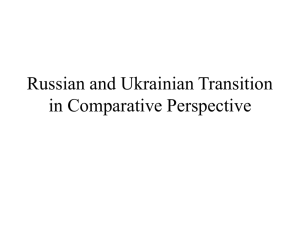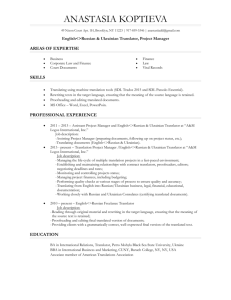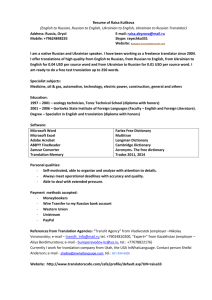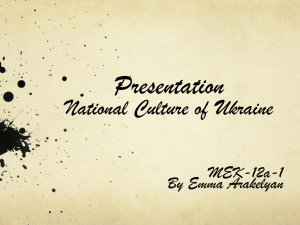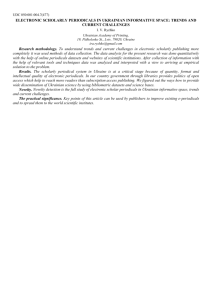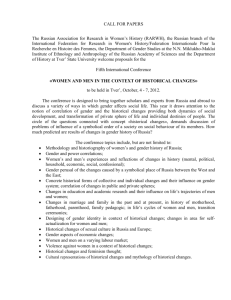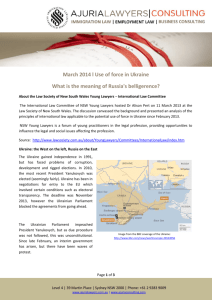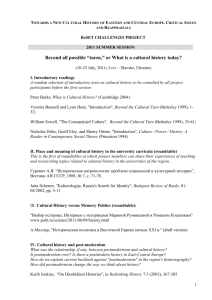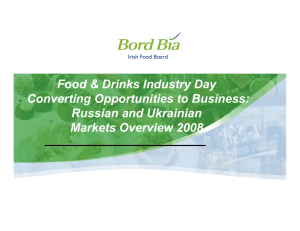Historical Faculty
advertisement
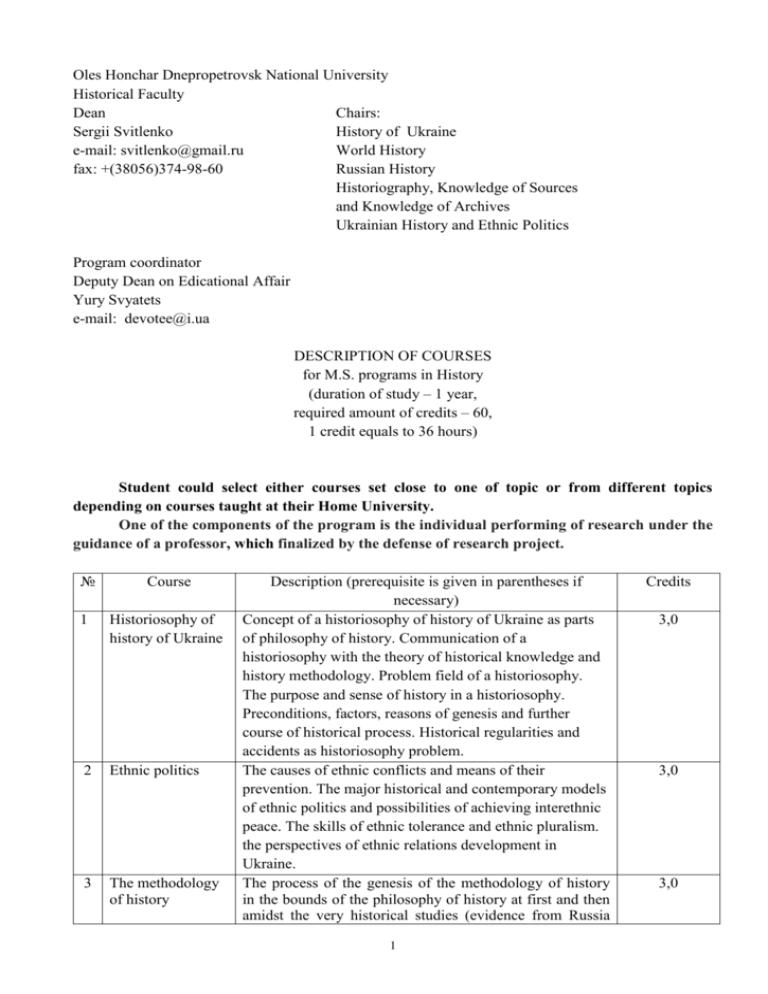
Oles Honchar Dnepropetrovsk National University Historical Faculty Dean Chairs: Sergii Svitlenko History of Ukraine e-mail: svitlenko@gmail.ru World History fax: +(38056)374-98-60 Russian History Historiography, Knowledge of Sources and Knowledge of Archives Ukrainian History and Ethnic Politics Program coordinator Deputy Dean on Edicational Affair Yury Svyatets e-mail: devotee@i.ua DESCRIPTION OF COURSES for M.S. programs in History (duration of study – 1 year, required amount of credits – 60, 1 credit equals to 36 hours) Student could select either courses set close to one of topic or from different topics depending on courses taught at their Home University. One of the components of the program is the individual performing of research under the guidance of a professor, which finalized by the defense of research project. № Course 1 Historiosophy of history of Ukraine 2 Ethnic politics 3 The methodology of history Description (prerequisite is given in parentheses if necessary) Concept of a historiosophy of history of Ukraine as parts of philosophy of history. Communication of a historiosophy with the theory of historical knowledge and history methodology. Problem field of a historiosophy. The purpose and sense of history in a historiosophy. Preconditions, factors, reasons of genesis and further course of historical process. Historical regularities and accidents as historiosophy problem. The causes of ethnic conflicts and means of their prevention. The major historical and contemporary models of ethnic politics and possibilities of achieving interethnic peace. The skills of ethnic tolerance and ethnic pluralism. the perspectives of ethnic relations development in Ukraine. The process of the genesis of the methodology of history in the bounds of the philosophy of history at first and then amidst the very historical studies (evidence from Russia 1 Credits 3,0 3,0 3,0 4 Historical informatics 5 Theory and methodology of source-study research 6 National policy Russian empire and USSR 7 History of European Culture 8 Cultural aspects of relations between Russia and the and the countries of Europe). The process of the formation of the methodology of history as a substantive ramification of the historical studies in the Soviet period of 60-80-s of the XX-th century and its evolution in the Ukrainian historical science in the years of independence (1991 – 2008). The main stages of the development of knowledge about the methodology of history contextually to the evolution of the philosophy of history and the Soviet historical science. The central criteria of scientific rigour in the historiographical practice Specifics of historical information. Modern information technologies of processing of historical data. Source oriented data bases and banks. Archives of machinereadable data. Full text historical databases. Systems of the computerized content analysis. Geographical information systems in historical researches. Internet technologies in archival and museum business. Expert systems in historical researches. Historical source and process of history studying. Study of objects of culture as the main task of source study. Historical source: cultural phenomenon and real object of research. Historical source as self-reliant research problem. Critics and interpretation of historical sources as the research problem. The historical source as anthropological benchmark of humanities studies. Terminology of source studies as instrument of cognition. Content and character of national policy in the period of Russian Empire 1721-1917. The dynamics of ethnoconfessional composition of Russian and Soviet society, the causes and course of various national conflicts in Russian Empire and USSR. Top tendencies in decision of national conflicts in different regions. Features of Ukrainian issue in national politics of Russian Empire and USSR Culture: term, classification. Kinds of art and some ways of their analyses. The largest museum collections of Europe. Antiquity as a step in European civilization shaping. Early Christian culture. Middle ages culture. Romanesque and Gothic architectural styles as the first All-European styles. Renaissance in Europe: common features and regional specific. National cultures in XVII century. Baroque and Classicism in Europe. French and English cultures` influence in XVIII century. Classicism, Romanticism and Realism in XIX-th century European cultures. Innovation of Impressionism: denial of traditions. European modernism as XX-th century culture phenomenon. Postmodernity. Diversity of ideas and art methods in contemporary culture. Culture as a way of diplomacy and reconciliation in Europe. The causes, nature and historical significance of cultural processes in the West and Russia, common and special in these processes, the interaction and mutual cultural 2 3,0 3,0 3,0 3,0 3,0 9 West realities of East and West, their role in the further formation and development of modern civilization.. Intellectual History of the Ancient Rus’ Hebrew-Christian Theological and Concrete-Historical Basis of the Mediaeval Christian Civilization, its temporal and territorial limits under intellectual point of views. State-making processes in the South-East Europe: the Great Ethnical Migration (German, Turk, Slavic, Hungarian and other political and ethnic components), System of Khaganats (Hunn, Avar, Bulgar and Khozar states), Slavic tribe unions, Norman military and merchant corporations. Intellectual basis of the as called ‘Russian Khaganate’ Conception. The statement of the Ryurik Dynasty and the compromise with the local Boyar elite as a intellectual Project. Foreign Policy of Svyatoslav Igorevich as a theological and dynasty construction. The Christianization of Rus’ under intellectual point of views: goth-arianian, mission, Askold and Volodymyr the Great stages. Territorial expansion and the national question in Russia. Features of the social structure of the peoples of Russia. Social mobility. Evolution of class corporations. Formation of the state legal system. Developing relationships and dynamics of crime. Traditions and culture of peoples of Russia. The definition of term “civilization”. The emergence of civilizational approach to the history of humanity. Civilizational concepts of Oswald Spengler and Arnold Toynbee. The attempts to unite economic and cultural studies’ approaches to history in the concept of I. Dyakonov. Global history and modernity of civilizations. Stem states, concentric circles and civilizational order. Modern opposition between civilizations. Structural changes of historical science in Ukraine (19912006): institualization and personnel. Modern foreign historiography of Ukrainian history. Theoretical and methodological foundations of the historiography of Ukrainian history. Strategies of historiographic metanarrative building in modern Ukrainian historiography Individual scientific work under the leadership of the teacher. The general acquaintance with the organization of educational process in a higher educational institution. Planning of practical preparation. Psychological and pedagogical monitoring and control of practice. Registration of reporting documentation. Individual qualification scientific work under the leadership of the professor. 10 Social history of the peoples of Russia 11 History of Civilizations 12 Topical Problems of Modern Ukrainian Historiography 13 Term paper 14 Practice of the diploma student 15 Thesis 3 3,0 3,0 3,0 3,0 3,0 9,0 16,5 4
